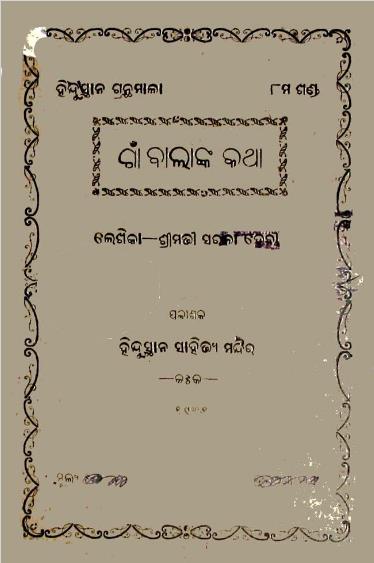In the landscape of Odia literature, the year 1935 is notable for the publication of Gan Balanka Katha, a pioneering essay by the esteemed writer Sarala Debi. Renowned for her contributions to Odia literature and social reform, Sarala Debi’s work is characterized by its incisive commentary on contemporary social issues, and Gan Balanka Katha is no exception. This essay not only showcases her literary prowess but also reflects her deep commitment to addressing the challenges faced by women and society during her time.
The title Gan Balanka Katha translates to The Story of the Children, suggesting a focus on themes of childhood and the experiences of young individuals within society. In this essay, Sarala Debi delves into the world of children, examining their rights, needs, and the sociocultural factors that influence their upbringing. Through her insightful observations, she critiques the societal structures that often neglect or misinterpret the importance of nurturing children in a holistic manner.
One of the striking features of Gan Balanka Katha is its exploration of the psychological landscape of children. Sarala Debi articulates the unique challenges that children face, including the pressures of societal expectations and the impact of systemic inequalities. By shedding light on these issues, she emphasizes the need for a more compassionate and understanding approach to child-rearing and education. Her essays resonate with readers not just as a call to action but as an invitation to reflect on the value of childhood and the intrinsic rights of every child.
Sarala Debi’s writing style is characterized by clarity and eloquence, making complex ideas accessible to a broad audience. Her use of vivid anecdotes and relatable experiences allows readers to connect emotionally with the subject matter. Throughout Gan Balanka Katha, she weaves in elements of her personal experiences as a woman and a mother, which adds depth to her narrative. This personal touch enhances the authenticity of her observations, making her arguments more persuasive and heartfelt.
Moreover, Gan Balanka Katha serves as a historical document that captures the socio-political climate of Odisha in the early 20th century. During this period, the region was experiencing significant changes, influenced by socio-economic factors and the burgeoning independence movement in India. Sarala Debi’s analysis extends beyond individual experiences to encompass the collective struggles of women and children in that era, advocating for their rightful place in society. Her essay serves as a critique of patriarchal structures and underscores the necessity of women’s empowerment in shaping a better future for all.
Additionally, Gan Balanka Katha emphasizes the role of education as a vital tool for social change. Sarala Debi passionately argues for the importance of educating girls and providing equal opportunities to all children, irrespective of their backgrounds. This focus on education not only reflects her progressive ideals but also marks her as a visionary thinker whose ideas were ahead of her time. By championing education as a means to uplift marginalized segments of society, she lays the groundwork for future reforms in education and social equity.
Books Info
| Books name | Gan Balanka Katha / ଗାଁ ବାଲାଙ୍କ କଥା |
| Author | Sarala Debi |
| No Of pages | 29 |
| Publisher | Hindustan sahitya mandira |
| Publication | 1935 |
| Printed At | NA |
| Distributor | NA |

